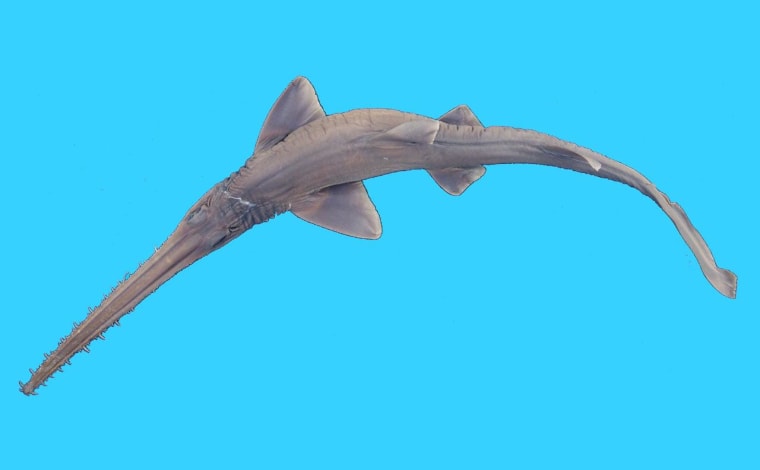Everyone knows about great white sharks, but have you seen the honeycomb catshark lately?
Nobody has. The last sighting of a honeycomb catshark was reported back in the 1970s, long before anyone even realized it was a species of its own. And that's what worries David Ebert, program manager for the Pacific Shark Research Center at the Moss Landing Marine Laboratories in California.
"This is a species we should be paying attention to, not the white shark," Ebert told NBC News. "When you get beyond the white shark, into some of these species that nobody's ever heard of, they're the 'lost sharks.'"
Unlike the white shark, these sharks are on the small side and pose little or no significant threat to humans. They don't grab the spotlight the way great whites do. In fact, some of the "lost sharks" are known as shysharks. "They're called that because when they get disturbed, they curl up and put their tails over their eyes," Ebert said.
Sign up for Science news delivered to your inbox
Unequal protection?
One of Ebert's main missions in ichthyology is to call attention to the sharks and rays that don't get their share of the spotlight — or their share of protection from overfishing and the other threats to fish species.
Last month, researchers reported that Atlantic and Pacific populations of white sharks are on the increase, thanks to conservation measures that have been fine-tuned over the course of decades. White sharks have been protected from fishing as a prohibited species since 1999, and some other shark species have long been subject to catch quotas.
"The quota that exists now is about 10 percent of the quota from 1993," said Dean Grubbs, a shark researcher at Florida State University's Coastal and Marine Laboratory.
Just this month, the federal government added the scalloped hammerhead shark to its endangered species list, which means "there will be special regulations to save them," said shark researcher Greg Cailliet, a professor emeritus at Moss Landing.
This is all well and good for great white sharks and hammerheads, but Ebert worries that lesser-known shark species like the honeycomb catshark are disappearing without any fanfare.
"It's too early for a call to arms, but we just don't know," Ebert said.
Gallery: Sharks of all sizes prowl the deep
How lost sharks are found
Ebert himself has found more than his share of lost sharks, through field studies as well as re-examinations of museum specimens. That's how he discovered a new kind of sawshark last year. He was sorting through specimens at the California Academy of Sciences — and determined that a shark captured and preserved back in 1966 was different from a species he and his colleagues had previously described, Pristiophorus nancyae.
The new species is now known officially as Pristiophorus lanae, or Lana's sawshark. "I named it after my niece," Ebert said.

The story is similar for the honeycomb catshark: The species was judged to be distinct from the Izak catshark in 2006, based on a close study of specimens collected in the 1970s in the Indian Ocean off the coast of southern Africa. It's listed as endangered, but no fresh specimens have been recorded in four decades, even though researchers now know what to look for.
Other sharks on Ebert's list of the lost include the Atlantic angel shark, the sixgill sawshark and the Natal shyshark. Some of those sharks are classified as endangered, while others have the label "data deficient," which means there's not enough information available to determine their status. That's the situation that Ebert wants to change.
"They might be perfectly fine, but nobody's looking for these things at all," Ebert said. "We need to be looking for them. ... I don't want to be sitting around in 10 years and saying, 'We used to see these things, but we don't see them around anymore.'"
NBC News dives in this week with an in-depth look at sharks and their relationship with humans. Look for full #SharkWatch coverage on TODAY, Nightly News and NBCNews.com.